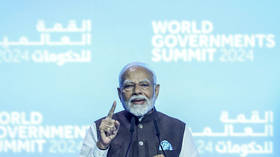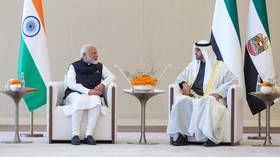Modi calls for overhaul of global institutions

Indian Prime Minister Narendra Modi on Wednesday underlined the necessity of promoting the concerns of the developing world, arguing that the Global South should participate more in international decision-making.
Speaking at the World Governments Summit in Dubai, UAE, Modi indicated that India is seeking a greater role in global governance institutions.
“Today, when we are transforming our country, shouldn’t there be reform in the global governance institutions as well?”, asked Modi before asserting that the Global South was under-represented.
New Delhi wrapped up a two-year stint as a non-permanent member of the United Nations Security Council (UNSC) in 2022 and is one of the leading voices calling for reforms in the UN. Indian Foreign Minister Subrahmanyam Jaishankar made a strong pitch for a “contemporary” UNSC, with India as a permanent member at the 78th session of the UN General Assembly (UNGA) in New York last year. Proposed reforms are likely to be discussed at the UN’s Summit of the Future in September this year.
In Dubai, Modi urged world leaders to listen to the voice of the Global South and bring forward their priorities. Additionally, Modi called on the world order to share its resources and capabilities with “needy” nations. India has increasingly positioned itself as the de facto leader of the Global South – a term referring to countries primarily located in Africa, Asia, and Latin America and often characterized as developing or underdeveloped compared to the wealthier economies of the so-called Global North.
New Delhi was also instrumental in the inclusion of the African Union in the G20 during its presidency last year. Weighing on the outcomes of this presidency, Modi has claimed that the world heard the “echo of the Global South.”
In his speech at the World Governments Summit, Modi also stressed that the world needs governments that are inclusive and use technology to facilitate reforms. “We will have to create a global protocol for emerging challenges like AI, cryptocurrency, and cybercrime,” the Indian leader warned. He, however, added that the countries will have to keep a balance between national sovereignty and international interdependence and adhere to the international rule of law while prioritizing national interests.
Pointing out that confidence in governments is waning in the aftermath of the Covid-19 pandemic, Modi claimed that the Indian public still has “complete faith” in his government’s “intent and commitment.” This, according to the Indian leader, is a result of his government’s focus on fulfilling the “needs and dreams” of the people.













